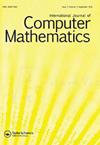分段连续参数随机微分方程修正部分截断Euler-Maruyama方法的收敛性和稳定性
IF 1.3
4区 数学
Q2 MATHEMATICS, APPLIED
International Journal of Computer Mathematics
Pub Date : 2023-10-23
DOI:10.1080/00207160.2023.2274278
引用次数: 0
摘要
摘要针对漂移系数和扩散系数超线性增长的分段连续参数随机微分方程,构造了一种改进的部分截断Euler-Maruyama (EM)方法。我们将spdepca的系数分为全局Lipschitz连续和超线性增长两个部分。我们的方法只是截断系数的超线性项,以克服由系数的非线性引起的潜在爆炸。建立了该方法的强收敛性理论,并给出了1/2的收敛率。此外,还提出了一种显式格式来保持底层spdeca的均方指数稳定性。通过数值实验对理论结果进行了验证。关键词:修正部分截断EM方法分段连续参数随机微分方程强收敛收敛率均方指数稳定性免责声明作为对作者和研究人员的服务,我们提供此版本的已接受稿件(AM)。在最终出版版本记录(VoR)之前,将对该手稿进行编辑、排版和审查。在制作和印前,可能会发现可能影响内容的错误,所有适用于期刊的法律免责声明也与这些版本有关。本工作得到中国国家科学基金(No. 12071101和No. 11671113)的支持。本文章由计算机程序翻译,如有差异,请以英文原文为准。
Convergence and stability of modified partially truncated Euler-Maruyama method for stochastic differential equations with piecewise continuous arguments
AbstractThis paper constructs a modified partially truncated Euler-Maruyama (EM) method for stochastic differential equations with piecewise continuous arguments (SDEPCAs), where the drift and diffusion coefficients grow superlinearly. We divide the coefficients of SDEPCAs into global Lipschitz continuous and superlinearly growing parts. Our method only truncates the superlinear terms of the coefficients to overcome the potential explosions caused by the nonlinearities of the coefficients. The strong convergence theory of this method is established and the 1/2 convergence rate is presented. Furthermore, an explicit scheme is developed to preserve the mean square exponential stability of underlying SDEPCAs. Several numerical experiments are offered to illustrate the theoretical results.Keywords: Modified partially truncated EM methodstochastic differential equations with piecewise continuous argumentsstrong convergenceconvergence ratemean square exponential stabilityDisclaimerAs a service to authors and researchers we are providing this version of an accepted manuscript (AM). Copyediting, typesetting, and review of the resulting proofs will be undertaken on this manuscript before final publication of the Version of Record (VoR). During production and pre-press, errors may be discovered which could affect the content, and all legal disclaimers that apply to the journal relate to these versions also. AcknowledgmentsThis work is supported by the NSF of PR China (No. 12071101 and No. 11671113).
求助全文
通过发布文献求助,成功后即可免费获取论文全文。
去求助
来源期刊
CiteScore
3.60
自引率
0.00%
发文量
72
审稿时长
5 months
期刊介绍:
International Journal of Computer Mathematics (IJCM) is a world-leading journal serving the community of researchers in numerical analysis and scientific computing from academia to industry. IJCM publishes original research papers of high scientific value in fields of computational mathematics with profound applications to science and engineering.
IJCM welcomes papers on the analysis and applications of innovative computational strategies as well as those with rigorous explorations of cutting-edge techniques and concerns in computational mathematics. Topics IJCM considers include:
• Numerical solutions of systems of partial differential equations
• Numerical solution of systems or of multi-dimensional partial differential equations
• Theory and computations of nonlocal modelling and fractional partial differential equations
• Novel multi-scale modelling and computational strategies
• Parallel computations
• Numerical optimization and controls
• Imaging algorithms and vision configurations
• Computational stochastic processes and inverse problems
• Stochastic partial differential equations, Monte Carlo simulations and uncertainty quantification
• Computational finance and applications
• Highly vibrant and robust algorithms, and applications in modern industries, including but not limited to multi-physics, economics and biomedicine.
Papers discussing only variations or combinations of existing methods without significant new computational properties or analysis are not of interest to IJCM.
Please note that research in the development of computer systems and theory of computing are not suitable for submission to IJCM. Please instead consider International Journal of Computer Mathematics: Computer Systems Theory (IJCM: CST) for your manuscript. Please note that any papers submitted relating to these fields will be transferred to IJCM:CST. Please ensure you submit your paper to the correct journal to save time reviewing and processing your work.
Papers developed from Conference Proceedings
Please note that papers developed from conference proceedings or previously published work must contain at least 40% new material and significantly extend or improve upon earlier research in order to be considered for IJCM.

 求助内容:
求助内容: 应助结果提醒方式:
应助结果提醒方式:


